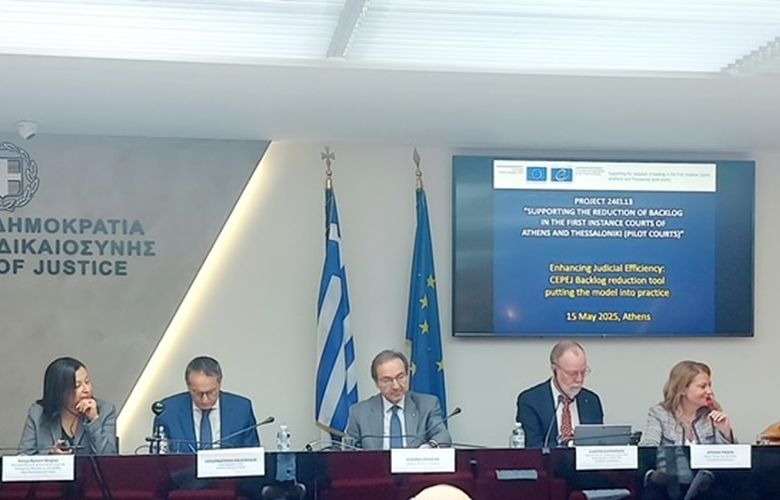How will Cepej’s tool work
With the aim of informing and raising awareness of the program to improve effective judicial protection and implement CEPEJ tool to reduce pending cases in Athens Court of First Instance and Thessaloniki (“Enhancing Judicial Efficiency: Cepej Backlog Reducjon Tool Pumng The Model Into Pracjce”), an event was held at the Ministry of Justice today.
The objectives of the European Union and the Council of Europe Common Program, as well as CEPEJ’s methodological tool to reduce the reducing tool, which includes four steps:
Identifying the accumulated pending and analysis of their causes (quantitative and qualitative analysis) Developing a strategy to effectively address accumulated pending monitoring of the application of viability to avoid repeating delays in the future.
During the event, good practices for enhancing effectiveness and reduce cases of cases, such as Case Studies to reduce delays and key challenges in their application, were presented.
The Deputy Minister of Justice, Mr. Ioannis Bougas thanked the cooperation and assistance they provide to Greece and the Ministry of Justice, Mr. Bjornsson, Head of DGreForm, Mr. Konstantinos Kousoulis, Vice President of the Council of State, a member of the CEPEJ, CEPEJ, a member of the European Commission. Djemni-Wagner, General Public Prosecutor at the French Court De Cassation, a member of CEPEJ, a representative of France.
“With the cooperation and know -how of the European institutions, we continue our reform work so that our country can comply with national and European requirements and converge on European standards. At the same time, we are reinforcing the immediacy and effectiveness of justice and further shield the rule of law, “the Deputy Minister of Justice said, adding that” according to the EU Justice Scoreboard, Greece has been in the last place in the EU in terms of first -degree urban and commercial affairs. Not only did this not only leave us indifferent, but it triggered a series of immediate decisions and overall interventions to deal with the timeless problems and pathogens of Greek justice. “
Mr. Bougas, referring to the delay in issuing decisions – which sometimes reaches the limits of negligence, emphasized that “limited logistics, human resources, and time -consuming procedures have led to our decision to make our decision to make a decision, Our country, from the 1,492 days required today, to approach until 2027 the average of the countries of the Council of Europe, ie 650 days for the final decision “to add that” the program presented today, is part of this precisely reform horizon. It is a common venture of the European Commission and of the Council of Europe, which is based on CEPEJ’s know -how and aims to reduce the pending cases that have accumulated at the Athens and Thessaloniki Court of First Instance. In the two, that is, more “burdensome” courts of our country, which collect the highest volume of cases and often operate under conditions of overload. “
DGreform chief Kjartan Bjornsson welcomed Greek initiatives and stressed “we can see the Greek government’s clear commitment to comprehensive reform in policy and judicial system. This project contributes to your coordinated efforts for better legislation. In addition, many reforms in Greek justice are ongoing: the new judicial map that unifies the courts and the revision of the Code of Civil Procedure aims to resolve cases faster. We want to fully support you in these efforts that are already bringing results: We are seeing a significant improvement in the rule of law, as well as in achieving the relevant landmark of the Recovery Fund. “
The event was attended by: Mr. Panagiotis Lymberopoulos, Vice President of the Supreme Court, Mrs Sofia Mantzakidou, President of the Three -Member Council of the Thessaloniki Court of Appeal, as well as the Head of the Court of First Instance of Athens. Judicial officers and judicial officers of the Court of First Instance and Court of First Instance of Athens and Thessaloniki and representatives of the Ministry of Justice were also participated. Finally, their presence honored the event professors of Law Schools, as well as the competent bodies, such as the Association of Judges and Prosecutors, the Athens and Thessaloniki Bar Associations, the Federation of Judicial Officers and the Organization for the Promotion of Alternatives.




